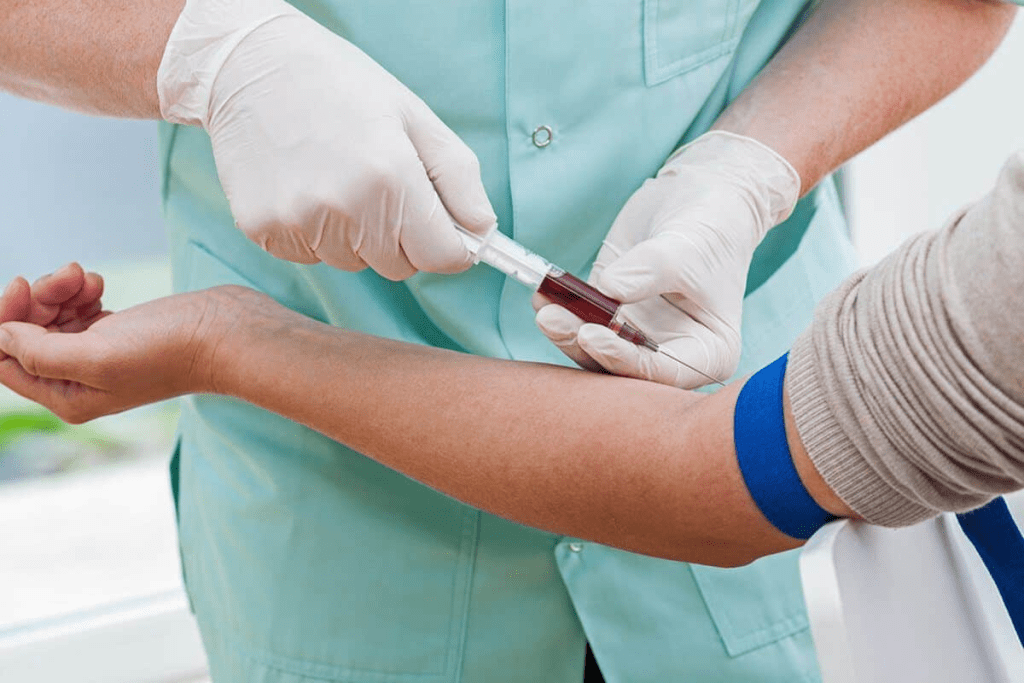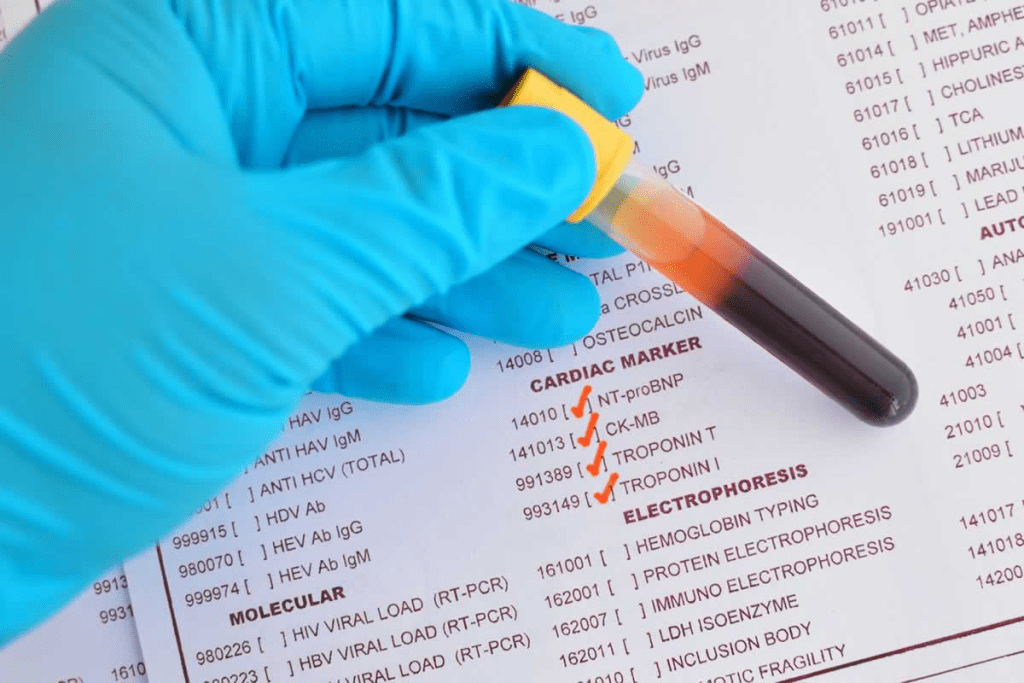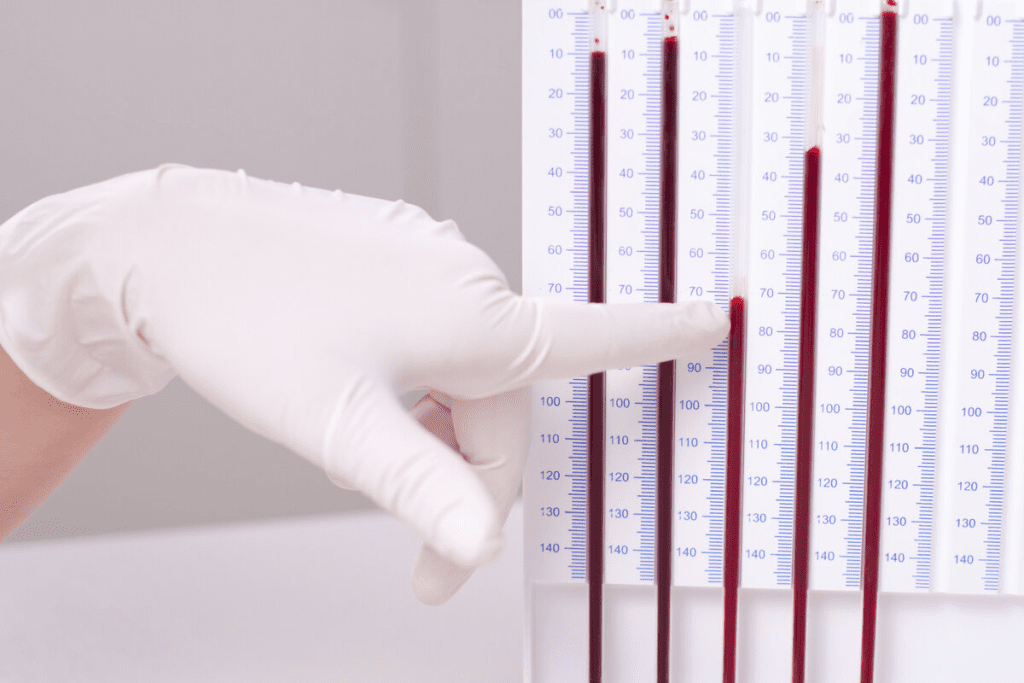
Autoimmune diseases affect millions of people worldwide. Did you know that over 80 autoimmune diseases exist, and many can be detected through bloodwork? Our ultimate guide to a test for antibodies explains everything. Discover amazing insights this powerful blood test can reveal about your health.
We look into how various autoimmune diseases are found through autoimmune disease testing. Blood tests are key in spotting specific antibodies linked to these conditions. This helps doctors diagnose and manage autoimmune disorders well.
It’s important to know how blood tests help find autoimmune diseases. By finding specific antibodies, doctors can spot an autoimmune condition. Then, they can create a treatment plan.
Key Takeaways
- Autoimmune diseases can be detected through blood tests that identify specific antibodies.
- Over 80 autoimmune diseases exist, and many can be diagnosed through autoimmune disease testing.
- Blood tests help healthcare professionals diagnose and manage autoimmune disorders effectively.
- Understanding the autoimmune blood test panel list is key for accurate diagnosis.
- Early detection of autoimmune diseases through bloodwork can significantly improve treatment outcomes.
The Science Behind Autoimmune Diseases
Autoimmune diseases happen when the immune system attacks healthy tissues by mistake. This can cause many different conditions that affect different parts of the body.
How the Immune System Attacks Itself
The immune system is meant to fight off harmful invaders like bacteria and viruses. But in autoimmune diseases, it mistakenly attacks the body’s own cells and tissues. This leads to inflammation and damage.
In diseases like rheumatoid arthritis, the immune system attacks the joints. This causes pain, swelling, and damage. Type 1 diabetes happens when the immune system attacks the pancreas’s insulin-making cells.
Why Blood Testing is Essential for Diagnosis
Blood tests are key in diagnosing autoimmune diseases. They help find specific autoantibodies linked to these conditions. This lets doctors know what’s causing symptoms and how to treat them.
Some common autoantibodies found in blood tests include:
| Autoantibody | Associated Condition |
| Antinuclear Antibodies (ANA) | Lupus, Rheumatoid Arthritis |
| Rheumatoid Factor (RF) | Rheumatoid Arthritis |
| Anti-CCP Antibodies | Rheumatoid Arthritis |
Blood tests are vital for diagnosing autoimmune diseases. They help doctors find the right autoantibodies and plan effective treatments.
Common Autoimmune Markers in Blood Tests

Blood tests are key in finding autoimmune conditions. They look for specific markers in the blood. Knowing these markers helps doctors diagnose and treat diseases.
Antinuclear Antibodies (ANA)
Antinuclear Antibodies (ANA) are a key sign of some autoimmune diseases, like Systemic Lupus Erythematosus (SLE). A blood test called the ANA test checks for ANA. A positive test might mean lupus or another autoimmune disease. But, a positive test doesn’t always mean you have a disease, as some healthy people can also test positive.
Key points about ANA:
- High sensitivity for lupus diagnosis
- Can be positive in other autoimmune diseases
- May be present in healthy individuals
Rheumatoid Factor (RF)
Rheumatoid Factor (RF) is a common marker in the blood. It’s linked to Rheumatoid Arthritis (RA), a disease that causes joint inflammation. RF is an antibody found through a blood test. While not only found in RA, high RF levels suggest RA or other autoimmune diseases.
Key aspects of RF:
- Commonly elevated in Rheumatoid Arthritis
- Can be present in other autoimmune and inflammatory conditions
- Used alongside other tests for RA diagnosis
C-Reactive Protein and Sedimentation Rate

C-Reactive Protein (CRP) and Sedimentation Rate (ESR or sed rate) show inflammation in the body. They’re not specific to autoimmune diseases but help assess inflammation and disease activity.
CRP and ESR are useful because they:
- Indicate the presence of inflammation
- Help monitor disease activity and response to treatment
- Are used alongside specific autoimmune markers for a full assessment
Knowing about these common markers is key for diagnosing and managing autoimmune diseases. By looking at these markers, doctors can understand the disease better and plan the right treatment.
Comprehensive Test for Antibodies: What You Need to Know
Comprehensive antibody testing is key in diagnosing and tracking autoimmune diseases. It finds specific antibodies linked to these diseases. This helps doctors diagnose and keep an eye on them.
Types of Autoantibody Tests
There are many autoantibody tests, each for different antibodies. Antinuclear Antibodies (ANA) tests are used to spot systemic lupus erythematosus and other autoimmune issues. Rheumatoid Factor (RF) tests are for diagnosing rheumatoid arthritis.
C-Reactive Protein (CRP) and Sedimentation Rate (ESR) tests show inflammation levels. They’re not specific to one disease but are useful for seeing if there’s inflammation.
How Antibody Testing Works
Antibody testing finds specific antibodies in the blood. When you have an autoimmune disease, your immune system makes antibodies against your own tissues. These can be found through blood tests, helping diagnose the disease.
To do this, a blood sample is taken and tested in a lab. The results show if certain autoantibodies are there. This helps doctors diagnose and track autoimmune diseases.
Sensitivity and Specificity Considerations
It’s important to know about the sensitivity and specificity of these tests. Sensitivity means how well a test finds people with the disease. Specificity means how well it finds people without the disease.
No test is perfect. So, knowing their limits is key for accurate diagnosis and treatment. We must look at test results with symptoms and other findings.
Rheumatoid Arthritis: Blood Test Indicators
Diagnosing rheumatoid arthritis often involves blood tests. These tests look for specific antibodies and markers of inflammation. They are vital for identifying the condition and tracking its progress.
Anti-CCP Antibodies
Anti-cyclic citrullinated peptide (anti-CCP) antibodies are a key part of diagnosing rheumatoid arthritis. These autoantibodies target the body’s own tissues. Their presence is a strong sign of rheumatoid arthritis.
Studies show that anti-CCP antibodies are very specific to rheumatoid arthritis. They can be detected even before symptoms start. This makes them important for early diagnosis.
Having anti-CCP antibodies means the disease might be more severe. It also increases the risk of joint damage. So, finding these antibodies early is key to starting treatment quickly.
RF and Other Inflammatory Markers
Rheumatoid Factor (RF) is another important blood test for rheumatoid arthritis. RF is an antibody found in many people with the disease. But it can also show up in other conditions. A high RF level suggests an autoimmune process.
Other markers like C-reactive protein (CRP) and erythrocyte sedimentation rate (ESR) are also measured. These help check the body’s inflammation level. This is important for diagnosing and tracking rheumatoid arthritis.
| Blood Test | Purpose | Significance in Rheumatoid Arthritis |
| Anti-CCP Antibodies | Detects autoantibodies against citrullinated proteins | High specificity for rheumatoid arthritis; associated with severe disease |
| Rheumatoid Factor (RF) | Measures antibodies against the Fc region of IgG | Can be elevated in rheumatoid arthritis and other autoimmune diseases |
| C-reactive Protein (CRP) | Assesses acute phase inflammation | Elevated levels indicate active inflammation |
| Erythrocyte Sedimentation Rate (ESR) | Measures the rate of red blood cell sedimentation | Elevated ESR indicates inflammation and can correlate with disease activity |
Healthcare providers use these blood tests together to make a precise diagnosis. This helps in creating an effective treatment plan for rheumatoid arthritis. Early detection and ongoing monitoring are essential for managing the condition and improving patient outcomes.
Lupus Detection Through Bloodwork
Lupus is a complex autoimmune disease that’s hard to diagnose. Blood tests are key in finding it. It affects millions globally, causing symptoms like other diseases, making it tough to diagnose.
Specific blood tests help spot lupus. They look for certain antibodies and signs linked to the disease.
Anti-dsDNA and Anti-Sm Antibodies
Anti-dsDNA antibodies are found in about 70% of lupus patients. They are a key sign of the disease. Their presence shows lupus activity, often in the kidneys.
Anti-Sm antibodies are in about 30% of lupus patients. Though less common, they are very specific to lupus. They are used to diagnose the disease.
Complement Levels and CBC Abnormalities
Testing complement levels is also part of lupus diagnosis. Complement proteins help antibodies fight off pathogens. In lupus, these levels are often low, showing active disease.
A Complete Blood Count (CBC) test is also important. It shows signs like anemia or low blood cell counts, common in lupus patients.
These tests together help doctors diagnose lupus and track its activity. Knowing the test results is key to managing the disease well.
- Presence of anti-dsDNA antibodies
- Presence of anti-Sm antibodies
- Low complement levels
- Abnormalities in CBC, such as anemia or low white blood cell count
By looking at these signs, we can understand lupus better. This helps guide treatment and improve patient care.
Thyroid Autoimmune Diseases in Blood Tests
Autoimmune thyroid diseases affect millions worldwide. Blood tests are key in diagnosing and managing these conditions. These diseases happen when the immune system attacks the thyroid gland by mistake.
Hashimoto’s Thyroiditis: TPO and Thyroglobulin Antibodies
Hashimoto’s thyroiditis is a common autoimmune condition. It happens when the immune system attacks the thyroid gland, causing hypothyroidism. The presence of thyroid peroxidase antibodies (TPOAb) and thyroglobulin antibodies (TgAb) in the blood is a key sign of this disease.
TPOAb and TgAb tests are vital for diagnosing Hashimoto’s thyroiditis. High levels of these antibodies show an autoimmune attack on the thyroid gland.
Graves’ Disease: TSI and TRAb Markers
Graves’ disease is another autoimmune thyroid condition. It causes hyperthyroidism because the immune system makes the thyroid gland produce too many thyroid hormones. Thyroid-stimulating immunoglobulin (TSI) and thyrotropin receptor antibodies (TRAb) are important markers for diagnosing Graves’ disease.
TSI and TRAb tests help tell Graves’ disease apart from other causes of hyperthyroidism. They also help monitor the disease’s activity.
Thyroid Function Tests and Their Significance
In addition to antibody tests, thyroid function tests (TFTs) are vital for checking the thyroid gland’s activity. TFTs measure thyroid-stimulating hormone (TSH), free thyroxine (FT4), and free triiodothyronine (FT3).
These tests show if the thyroid is underactive (hypothyroidism) or overactive (hyperthyroidism). They guide treatment decisions.
| Condition | Key Antibodies | Thyroid Function |
| Hashimoto’s Thyroiditis | TPOAb, TgAb | Hypothyroidism |
| Graves’ Disease | TSI, TRAb | Hyperthyroidism |
Celiac Disease and Blood Testing
Blood tests are key in finding celiac disease. This condition happens when the immune system reacts to gluten. It’s an autoimmune disorder that can lead to many symptoms, like stomach problems, tiredness, and not getting enough nutrients.
Tissue Transglutaminase Antibodies (tTG-IgA)
The main blood test for celiac disease checks for tTG-IgA antibodies. tTG-IgA antibodies are made by the immune system in response to gluten. If these antibodies are high, it’s a strong sign of celiac disease. But, a positive test needs more checks or a biopsy to confirm.
Deamidated Gliadin Peptide Antibodies (DGP)
DGP antibodies are another important test. DGP antibodies are also made in response to gluten. They show an autoimmune reaction. This test is useful, like for kids under two, when tTG-IgA tests might not work well.
Total IgA Levels and Their Importance
It’s also important to check total IgA levels when looking at tTG-IgA tests. Some people have IgA deficiency, making tTG-IgA tests not work. Checking total IgA levels helps make sure celiac disease tests are right. If IgA levels are low, other tests like tTG-IgG or DGP-IgG might be used.
“The diagnosis of celiac disease involves a combination of clinical evaluation, serological testing, and intestinal biopsy. Blood tests are a critical first step in identifying individuals who may have celiac disease and require further evaluation.”
Knowing how blood tests help find celiac disease is key. This includes looking at tTG-IgA, DGP antibodies, and total IgA levels. Doctors can then accurately diagnose and manage this condition. This helps patients live a gluten-free life and feel better.
Multiple Sclerosis: What Blood Tests Can and Cannot Show
Diagnosing multiple sclerosis (MS) is complex. It involves blood tests and cerebrospinal fluid analysis. MS affects the central nervous system, needing a detailed diagnosis.
Blood tests aren’t the final say for MS. Yet, they’re key in ruling out other conditions that might look like MS. They help us find the real cause of symptoms.
Oligoclonal Bands and Cerebrospinal Fluid Analysis
Oligoclonal bands (OCBs) are proteins found in the cerebrospinal fluid (CSF) of many MS patients. A lumbar puncture is needed to find OCBs in the CSF. OCBs, along with other signs, can help confirm an MS diagnosis.
Blood Tests to Rule Out MS Mimics
Blood tests help rule out other conditions that might look like MS. For example, they check for vitamin deficiencies or infections. By excluding these, doctors can better pinpoint MS.
Why MS Diagnosis Requires More Than Blood Tests
While blood tests are useful, diagnosing MS needs more. It involves clinical evaluation, medical history, and imaging studies. No single test can confirm MS. The diagnosis comes from a full review of all information.
In summary, blood tests are vital in diagnosing multiple sclerosis. They help rule out other conditions and support a diagnosis when combined with other findings.
Type 1 Diabetes: Autoimmune Markers
Type 1 diabetes is a complex autoimmune condition. It has been better understood through specific markers. These markers are key for diagnosing and managing the disease.
Islet Cell Antibodies (ICA)
Islet Cell Antibodies (ICA) are early markers for Type 1 diabetes. They target the islet cells in the pancreas, where insulin is made. The presence of ICA shows an autoimmune attack on the pancreas.
Glutamic Acid Decarboxylase Antibodies (GADA)
Glutamic Acid Decarboxylase Antibodies (GADA) are also important. GADA are found in many with Type 1 diabetes. They are linked to the destruction of pancreatic beta cells.
Insulin Autoantibodies (IAA) and ZnT8
Insulin Autoantibodies (IAA) are common in Type 1 diabetes, often before symptoms appear. ZnT8 antibodies, discovered later, also show an autoimmune attack on the pancreas. Finding these antibodies, together, is strong evidence for Type 1 diabetes.
Blood tests detect these autoimmune markers, which are vital for diagnosing Type 1 diabetes. Knowing about ICA, GADA, IAA, and ZnT8 helps doctors make better care plans.
Key Autoimmune Markers for Type 1 Diabetes:
- Islet Cell Antibodies (ICA)
- Glutamic Acid Decarboxylase Antibodies (GADA)
- Insulin Autoantibodies (IAA)
- ZnT8 Antibodies
By finding these markers, we can understand Type 1 diabetes better. This helps us create more effective treatment plans.
Other Autoimmune Diseases Detectable in Blood Tests
Autoimmune diseases show up in many ways. Blood tests are key in diagnosing conditions like autoimmune hepatitis and Sjögren’s syndrome. They help find specific autoantibodies linked to different diseases. This lets doctors give treatments that really work.
Sjögren’s Syndrome: Anti-SSA and Anti-SSB
Sjögren’s syndrome is a long-lasting disease that hurts the glands that make saliva and tears. Blood tests are important in finding Sjögren’s syndrome. They look for certain autoantibodies.
- Anti-SSA (Ro) antibodies: About 70% of people with Sjögren’s have these. They show a higher chance of other symptoms.
- Anti-SSB (La) antibodies: Around 40% have these. They often show up with anti-SSA and help confirm Sjögren’s syndrome.
Having these antibodies, along with symptoms like dry eyes and mouth, helps doctors know if someone has Sjögren’s syndrome.
Autoimmune Hepatitis: Anti-Smooth Muscle and Anti-LKM-1
Autoimmune hepatitis is when the immune system attacks liver cells. Blood tests are key in finding this condition. They look for specific autoantibodies.
- Anti-smooth muscle antibodies (ASMA): These are common in type 1 autoimmune hepatitis. They are a big clue for doctors.
- Liver kidney microsomal type 1 (LKM-1) antibodies: These are linked to type 2 autoimmune hepatitis. They target a specific liver enzyme.
Finding these antibodies, along with high liver enzymes and certain liver findings, helps doctors diagnose and understand autoimmune hepatitis.
Vasculitis: ANCA and Anti-GBM Antibodies
Vasculitis is inflammation of the blood vessels. It can be caused by many autoimmune diseases. Blood tests help find certain vasculitis types by looking for specific autoantibodies.
- Anti-neutrophil cytoplasmic antibodies (ANCA): These are linked to ANCA-associated vasculitides like granulomatosis with polyangiitis (GPA) and microscopic polyangiitis (MPA).
- Anti-glomerular basement membrane (anti-GBM) antibodies: These are found in Goodpasture’s syndrome. It’s a rare disease that affects the kidneys and lungs.
Finding these autoantibodies is key for diagnosing and treating vasculitis. It lets doctors use treatments that really help.
The Autoimmune Blood Test Panel Explained
An autoimmune blood test panel is a detailed tool for finding autoimmune diseases. It includes many tests to spot specific conditions. This helps doctors treat patients quickly and well.
What’s Included in a Comprehensive Panel
This panel tests for autoantibodies linked to different diseases. Common tests are:
- Antinuclear Antibodies (ANA): Helps find lupus.
- Rheumatoid Factor (RF): Diagnoses rheumatoid arthritis.
- Thyroid Antibodies: Like TPO and thyroglobulin for Hashimoto’s thyroiditis.
- Celiac Disease Panels: Includes tTG-IgA for celiac disease.
These tests find specific autoantibodies. They are key for diagnosing autoimmune diseases.
When a Full Panel is Recommended
A full panel is suggested for symptoms of autoimmune diseases. Symptoms include:
- Chronic fatigue
- Joint pain or swelling
- Skin rashes
- Gastrointestinal issues
Doctors also suggest it for family histories of autoimmune diseases. Or if initial tests hint at an autoimmune condition.
Cost Considerations and Insurance Coverage
The cost of an autoimmune blood test panel varies. It depends on the tests and the healthcare provider. Insurance coverage is also key in what you pay out-of-pocket.
It’s important to check with your insurance about what’s covered. Some plans need pre-authorization for tests. Others have specific networks of providers.
Talking to your healthcare provider about insurance and costs is a good idea. This helps plan your expenses.
Interpreting Your Autoimmune Blood Test Results
Understanding your autoimmune blood test results is key to managing your health. When you get your results, it’s important to know what they mean. This helps you understand your condition better.
Understanding Reference Ranges
Reference ranges are vital for interpreting blood test results. They show what’s normal for a test, based on healthy people’s averages. Your doctor compares your results to these ranges to see if you’re okay or if there’s a problem.
It’s important to know that reference ranges can differ between labs. This is because labs use different equipment and methods. So, your doctor will look at both your results and the lab’s reference range.
What Positive Results Mean (and Don’t Mean)
A positive result on an autoimmune blood test can be scary. It means you have specific autoantibodies linked to autoimmune diseases. But, having these autoantibodies doesn’t always mean you have the disease. Some people might have positive results without symptoms.
On the other hand, a negative result doesn’t always mean you’re in the clear. Some autoimmune diseases might not show up in blood tests. Or, the disease might be in a stage where the autoantibodies are not yet present in significant amounts.
The Importance of Clinical Correlation
Clinical correlation is about linking your blood test results to your overall health. This is key for accurate diagnosis and treatment planning.
Your doctor will look at your test results along with your symptoms, medical history, and physical exam. They might suggest more tests to get a clearer picture. By combining your test results with your health situation, your healthcare team can understand your condition well. They can then create a treatment plan just for you.
In summary, understanding autoimmune blood test results needs a deep look at reference ranges, what positive or negative results mean, and the role of clinical correlation. By working with your healthcare provider, you can better understand your condition. This helps you manage your health effectively.
When Blood Tests Are Normal But Symptoms Persist
Persistent symptoms with normal blood tests can be really tough for both patients and doctors. We need to look for other reasons and ways to diagnose.
Seronegative Autoimmune Conditions
Some autoimmune diseases don’t show up in blood tests. This is called seronegative autoimmune conditions. These diseases can cause big symptoms and need careful diagnosis.
- Seronegative rheumatoid arthritis
- Lupus without typical autoantibodies
- Other autoimmune conditions not detected by standard tests
In these cases, we use clinical evaluation and more tests to find the diagnosis.
Additional Diagnostic Methods
When blood tests are normal but symptoms stay, we use more tests. These include:
- Imaging studies (e.g., X-rays, MRI, ultrasound)
- Biopsy of affected tissues
- Specialized tests for specific conditions
These tests help us find more info and possibly the cause of symptoms.
The Role of Symptom Tracking
Tracking symptoms is key in diagnosing seronegative autoimmune conditions. By noting the patient’s symptoms, we can spot patterns and triggers.
Key aspects to track include:
- Symptom severity and duration
- Any triggers or things that help
- How symptoms affect daily life
This info is super helpful for making the right diagnosis and treatment plan.
Who Should Get Tested and When
Some risk factors and symptoms suggest the need for autoimmune disease testing. It’s important to know these signs. This helps find people who might need early diagnosis and treatment.
Risk Factors for Autoimmune Diseases
Several factors can raise the chance of getting an autoimmune disease. These include:
- Genetic predisposition
- Environmental triggers
- Hormonal influences
- Other autoimmune diseases
Table 1: Common Risk Factors for Autoimmune Diseases
| Risk Factor | Description | Examples |
| Genetic Predisposition | Family history of autoimmune diseases | Rheumatoid arthritis, Lupus |
| Environmental Triggers | Exposure to certain chemicals or infections | Silica exposure, Epstein-Barr virus |
| Hormonal Influences | Changes in hormone levels | Pregnancy, thyroid disorders |
Symptoms That Warrant Testing
Autoimmune diseases can show up in many ways, making diagnosis hard. Common symptoms that might need testing include:
- Persistent fatigue
- Joint pain and swelling
- Skin rashes
- Gastrointestinal issues
Family History Considerations
A family history of autoimmune diseases is a big risk factor. If you have a first-degree relative with an autoimmune condition, you’re more likely to get one. Talk to your healthcare provider about your family history to figure out what to do next.
Knowing these factors helps people make smart health choices. They can decide when to get tested.
The Testing Process: What to Expect
Learning about the testing process for autoimmune diseases can help reduce anxiety. We’ll guide you through what to expect, from preparation to getting your results.
Preparation for Autoimmune Blood Tests
Before your autoimmune blood tests, you might need to prepare. Always follow your healthcare provider’s instructions. They might ask you to fast or avoid certain medicines that could affect the test results.
Some tests need you to fast for a while. Your doctor will tell you about any special requirements. It’s also important to tell them about all the medicines and supplements you’re taking. These can change how the tests come out.
Timeline for Results
The time it takes to get your test results varies. Usually, it’s a few days to a week. But, some tests might take longer.
Your doctor will let you know when to expect your results. It’s important to follow up with them. They’ll explain what your results mean and what to do next.
Follow-up Testing Requirements
At times, the first tests might not give a clear diagnosis. This means you might need follow-up testing. This could include more blood tests, imaging, or other tests to confirm an autoimmune disease.
Follow-up tests are key to getting a proper diagnosis. They help doctors get more information and plan the right treatment. We know this process can be long and worrying. But, it’s a necessary step to manage your condition well.
Emerging Technologies in Autoimmune Testing
Autoimmune disease diagnosis is changing fast with new technologies. These new tools help doctors find diseases sooner and more accurately.
Multi-autoantibody arrays are a big step forward. They can spot many autoantibodies at once. This gives a clearer picture of a patient’s health.
Multi-Autoantibody Arrays
Multi-autoantibody arrays are a big leap in finding autoimmune diseases. They check many autoantibodies at once. This makes diagnosis faster and uses less sample.
The good things about these arrays are:
- They’re more accurate
- They find diseases early
- They need less sample
- They help start treatment sooner
Genetic Testing for Autoimmune Predisposition
Genetic testing for autoimmune predisposition is another new tool. It looks for genes that might lead to certain diseases. It’s not a diagnosis, but it shows who might be at risk.
Genetic testing helps by:
- Starting early screenings
- Helping change lifestyle to lower risk
- Starting preventive steps
- Creating treatment plans based on genes
Future Directions in Early Detection
We’re moving towards even better ways to find diseases early. New methods might use artificial intelligence to look at lots of data. This includes genes, autoantibodies, and symptoms.
New technologies could change how we find autoimmune diseases. By using advanced tests and data analysis, we might catch diseases before symptoms show. This could lead to better treatment and care for patients.
As research keeps going, we’ll see more new ways to test for autoimmune diseases. This will help patients get better care and manage their diseases better.
Conclusion: Navigating Your Autoimmune Diagnosis Journey
Getting an autoimmune diagnosis can be tough. But, knowing how it’s diagnosed and working with doctors can make it easier. We’ve looked at how blood tests can find diseases like rheumatoid arthritis, lupus, and thyroid issues.
Handling an autoimmune diagnosis needs a full plan. This means understanding test results and knowing about different autoantibody tests. We want to help people be more involved in their health and make smart choices about treatment.
New tech like multi-autoantibody arrays and genetic tests might help find diseases early. By teaming up with doctors and staying up-to-date, people can manage their diagnosis better. This can lead to a better life overall.
FAQ
What autoimmune diseases can be detected through bloodwork?
Blood tests can spot many autoimmune diseases. These include rheumatoid arthritis, lupus, and thyroid issues. Celiac disease, multiple sclerosis, and type 1 diabetes are also detectable.
What are autoantibodies, and why are they important in diagnosing autoimmune diseases?
Autoantibodies are proteins that attack the body’s own tissues. Blood tests find these autoantibodies. They’re key for diagnosing autoimmune diseases.
What is an ANA test, and what does it indicate?
The ANA test looks for ANA antibodies in the blood. These are linked to diseases like lupus. A positive test suggests an autoimmune issue, but it’s not a sure sign.
How is rheumatoid arthritis diagnosed using blood tests?
Blood tests check for anti-CCP antibodies and Rheumatoid Factor (RF). These tests help confirm rheumatoid arthritis and track its progress.
What blood tests are used to diagnose lupus?
Lupus diagnosis involves tests for anti-dsDNA and anti-Sm antibodies. It also looks at complement levels. These, along with symptoms, help make a diagnosis.
Can blood tests diagnose multiple sclerosis?
Blood tests can rule out other conditions that might look like MS. But, diagnosing MS mainly involves cerebrospinal fluid analysis and imaging studies.
How are thyroid autoimmune diseases diagnosed?
Blood tests for thyroid diseases look for specific antibodies. These include TPO, thyroglobulin, TSI, and TRAb. They help diagnose Hashimoto’s and Graves’ disease.
What is a comprehensive autoimmune blood test panel?
This panel includes many tests to find different autoimmune diseases. It looks for various autoantibodies and markers of inflammation.
How long do autoimmune blood test results take?
Results vary by test and lab. Usually, they’re ready in a few days to a week.
What should I expect during the testing process for autoimmune diseases?
You might not need to prepare much for these tests. Just follow your doctor’s instructions. Knowing when to expect results and any follow-up tests can help calm your nerves.
Can I have an autoimmune disease with normal blood work?
Yes, some autoimmune diseases show up even with normal blood tests. This is true for some seronegative conditions. Other tests and tracking symptoms are important for diagnosis.
How do emerging technologies impact autoimmune disease diagnosis?
New technologies like multi-autoantibody arrays and genetic testing are making diagnosis faster and more accurate. They offer hope for early detection of autoimmune diseases.
References
Castro, C. (2010). Diagnostic testing and interpretation of tests for autoimmune diseases. Autoimmunity Reviews, 9(2), 127-135. https://pmc.ncbi.nlm.nih.gov/articles/PMC2832720/


































